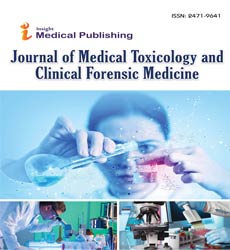Hidden Dangers: Exploring the Significance of Toxicology in Forensic Investigations
Schwartz Kathleen*
Published Date: 2024-01-15Schwartz Kathleen*
Department of Network Forensics, Halmstad University, Halmstad, Sweden
- *Corresponding Author:
- Schwartz Kathleen
Department of Network Forensics,
Halmstad University,
Halmstad,
Sweden;
E-mail: Kathleen_s@gmail.com
Received date: August 08, 2023, Manuscript No. IPJMTCM-23-17766; Editor assigned date: August 10, 2023, PreQC No. IPJMTCM-23-17766 (PQ); Reviewed date: August 24, 2023, QC No. IPJMTCM-23-17766; Revised date: January 08, 2024, Manuscript No. IPJMTCM-23-17766 (R); Published date: January 15, 2024, DOI: 10.36648/2471-9641.10.1.63
Citation: Kathleen S (2024) Hidden Dangers: Exploring the Significance of Toxicology in Forensic Investigations. J Med Toxicol Clin Forensic Med Vol: 10 No:1
Introduction
Toxicology is a branch of forensic science that involves the study of chemicals, substances, and their effects on living organisms. It plays a crucial role in identifying the presence of toxins, drugs, and poisons in biological samples and understanding their impact on human health. Here's an overview of toxicology in the context of forensic science types of toxicology analytical toxicology involves the identification and quantification of drugs, chemicals, and toxins in biological samples, such as blood, urine, and tissues. Clinical toxicology focuses on diagnosing and managing cases of poisoning or overdose in a medical setting. Forensic toxicology deals with the analysis of biological samples to determine the presence of substances that may have contributed to a person's death or affected their behavior. Applications cause of death determination toxicology plays a critical role in identifying whether drugs, poisons, or other toxic substances contributed to a person's death. Impairment analysis toxicological analysis can determine whether a person was under the influence of drugs or alcohol at the time of an accident or incident.
Description
Postmortem toxicology
Postmortem toxicology after a suspicious death, forensic toxicologists analyze samples to determine if toxic substances played a role in the person's demise. Drugs and driving toxicology is used to identify drugs and their concentrations in drivers involved in accidents or traffic violations. Drug overdose toxicologists analyze samples from overdose victims to identify the substances responsible for the overdose. Workplace exposure in cases of suspected occupational exposure to hazardous substances, toxicology can confirm the presence of toxins in biological samples. Process sample collection biological samples, such as blood, urine, hair, and tissues, are collected from the individual or deceased person.
Sample preparation: The collected samples are processed to extract the substances of interest in a form suitable for analysis. Instrumental analysis advanced analytical techniques, such as Gas Chromatography (GC), Liquid Chromatography (LC), Mass Spectrometry (MS), and spectroscopy, are used to identify and quantify substances in the samples. Data interpretation toxicologists analyze the results of instrumental analysis to determine the presence, concentration, and significance of substances in the samples.
Reporting toxicologists create detailed reports summarizing their findings, which are used by law enforcement, medical examiners, and legal professionals. Challenge postmortem redistribution after death, some substances can redistribute within the body, affecting accurate toxicological analysis.
Metabolism: The metabolism of substances in the body can complicate interpretation, as some drugs may be converted into different compounds.
Drug interactions: Interaction between multiple drugs can result in unexpected effects and complicate toxicological analysis.
Sample degradation: Improper collection, storage, or handling of samples can lead to degradation of substances and inaccurate results.
Forensic toxicologist: Forensic toxicologists work in collaboration with medical examiners, law enforcement agencies, and legal professionals to provide objective and scientifically based evidence related to the presence of toxic substances in legal cases. Their expertise is crucial in understanding the effects of chemicals on the human body and its implications for investigations and legal proceedings. Toxicology is a branch of forensic science that involves the study of substances and chemicals that can have harmful effects on living organisms. In the context of forensic toxicology, the focus is on analyzing biological samples, such as blood, urine, and tissues, to determine the presence of drugs, alcohol, poisons, and other substances that may be relevant to criminal investigations, medical cases, and legal proceedings. Here's an overview of toxicology in forensic science key areas of forensic toxicology postmortem toxicology In cases of suspicious or unexplained deaths, toxicologists analyze biological samples from the deceased to identify the presence of drugs, alcohol, or other substances that may have contributed to the death.
DUI/DWI cases forensic toxicology is often used in cases involving Driving Under the Influence (DUI) or Driving While Intoxicated (DWI). Blood or breath samples are tested to determine Blood Alcohol Concentration (BAC) and the presence of drugs. Drug overdose cases toxicology plays a critical role in cases of drug overdoses. It helps determine the substances present in a person's system and whether the overdose was accidental or intentional. Criminal investigations toxicology analysis can reveal the presence of drugs or poisons that may have been used to harm or incapacitate a victim, potentially leading to criminal charges. Sexual assault cases toxicology testing can detect the presence of drugs or substances that may have been administered to victims in cases of sexual assault or date rape. Process of forensic toxicology sample collection biological samples such as blood, urine, hair, and tissues are collected from the individual, victim, or deceased person. Sample preservation proper preservation of samples is crucial to prevent degradation of substances and maintain the accuracy of results. Extraction techniques are used to extract the substances of interest from the samples for analysis. Instrumental analysis sophisticated analytical techniques, such as gas chromatography, liquid chromatography, mass spectrometry, and immunoassays, are employed to identify and quantify substances in the samples.
Data interpretation toxicologists interpret the results based on established reference ranges and known toxic levels of substances. They determine whether the detected substances are relevant to the case. Reporting and expert testimony toxicologists create detailed reports summarizing their findings. They may provide expert testimony in court to explain the results and their significance to judges and juries. Types of substances analyzed alcohol toxicologists measure Blood Alcohol Concentration (BAC) to determine impairment levels in cases of DUI/DWI. Drugs detection of illicit drugs, prescription medications, and over-the-counter substances is common in toxicology analysis. Poisons toxicologists can identify toxic substances, including heavy metals and chemical compounds. Metabolites some substances are metabolized in the body into other compounds. Detecting metabolites can provide insights into recent substance use. Challenges metabolism substances can be rapidly metabolized, making their detection challenging if testing is delayed.
Conclusion
Sample quality proper handling, preservation, and storage of samples are essential to maintain accurate results. Interpretation toxicologists must consider factors such as individual tolerance, drug interactions, and medical conditions that could affect the interpretation of results. Forensic toxicology plays a vital role in revealing the presence of harmful substances in various contexts, contributing to the understanding of events and supporting legal and medical decisions.

Open Access Journals
- Aquaculture & Veterinary Science
- Chemistry & Chemical Sciences
- Clinical Sciences
- Engineering
- General Science
- Genetics & Molecular Biology
- Health Care & Nursing
- Immunology & Microbiology
- Materials Science
- Mathematics & Physics
- Medical Sciences
- Neurology & Psychiatry
- Oncology & Cancer Science
- Pharmaceutical Sciences
